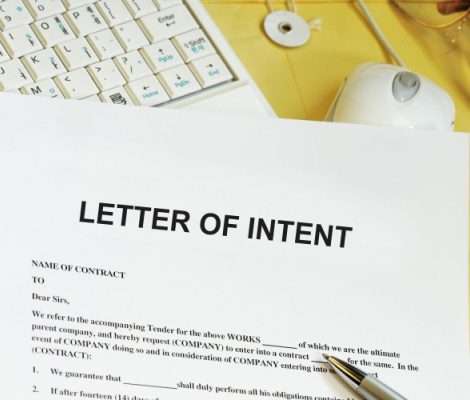
In working with our dentists, one of the most exciting events that we get to experience is when one of our dental clients receives a letter of intent (“LOI”) for the sale of their dental practice or their dental practice assets. Think about it for a moment. As a dentist, you have spent your entire career building a successful business, and as part of your retirement and succession plan, you have now decided to sell that business. It is an emotional time, a stressful time—but as many of you have told us, it is also an exciting time. You are now about to receive a LOI related to that potential sale. You start to wonder: What is a LOI? What is the next step? And what does a third party believe my long, disciplined efforts are worth when it comes to the value of my dental practice? For a dentist who has often spent an entire career building a dental practice, it is important to understand the terms and conditions of this LOI in order to make an informed decision about that next step.
What Is an LOI?
In its simplest terms an LOI is a document declaring the preliminary commitment of one party (the “Purchaser”) to purchase the business or business assets of another party (the “Seller”). The Purchaser usually submits the LOI after completing a certain amount of due diligence regarding that business; only after that preliminary due diligence is complete will the Purchaser decide to make an offer to purchase the business or business assets by submitting a LOI declaring their commitment to do so.
What Is Next?
The next step is a more formal due diligence period. The due diligence period is usually the period after the LOI is signed and before the sale of the dental practice closes, although that timing can vary. So, once the LOI is signed, the parties share relevant information and, by doing so, the parties begin to better understand each other. Typically, it is the Purchaser that drives that due diligence request for information because the Purchaser will be the one extending the capital to acquire the dental practice. The Purchaser generally provides the Seller with due diligence checklists. The checklists usually request both legal and operational items. These items often include tax returns, profit-and-loss statements, balance statements, production and collection reports, payroll reports, payor mix reports, and procedure mix reports. A potential Purchaser will often have the Seller fill out a questionnaire that requests information about the practice, such as the dental software utilized, the lease information and practice locations, staff members, associates, and hours of the practice.
Nardone Comment: Although we agree that it is the Purchaser who is conducting much of the due diligence, as a Seller, you have an obligation to yourself, your family, and your team, to ensure you are comfortable with who this potential Purchaser is, and what the terms related to the potential Purchaser are. Thus, you also need to work hard during this due diligence period to ask questions and do your own due diligence.
Terms of an LOI
Now, depending upon who the Purchaser is, the terms of the LOI may vary. That is, a single dentist who is looking to purchase their first dental practice will have certain priorities and concerns that differ from a dental service organization (“DSO”) that is looking to purchase their 200th dental practice. It is all about perspective. But there are some key terms of every LOI that we will cover in this blog post.
Who are the Parties to the LOI?
The Parties to an LOI are the selling dentist, the selling dentist’s practice entity, and the Purchaser, which can be an individual dentist or a purchasing entity, including a DSO.
What is being bought and sold?
The LOI will indicate whether the sale is an asset sale or a stock sale. Most sales in the dental space are asset sales. Purchasers often prefer an asset sale because an asset sale provides certain tax benefits when it comes to depreciation, and it reduces the likelihood of liability exposure for the Purchaser. It cannot be overstated, selling dentists should work closely with their tax advisors before agreeing to a particular structure.
What is the Purchase Price?
While some Sellers would consider the total purchase price the most important part of the LOI, you must carefully look at what is included in the breakdown of the purchase price, which can include the following:
- Cash at closing: the actual amount of cash given to the Seller at closing.
- Purchase price holdback: an amount of the purchase price that is held back from the cash at closing and is paid out on a later date, often twelve months after the closing.
- Accounts payable or working capital holdback: an amount of the purchase price that is held back from the cash at closing to ensure that there is enough cash to operate the business for a period following closing.
What is the due diligence period?
As discussed, the due diligence period usually occurs between the execution, a.k.a. signing, of the LOI by both parties and continues until closing. This is an opportunity for the Seller and Purchaser to get to know each other better through the request and review of various documentation.
When will the sale close?
The LOI usually indicates a target closing date, or the length of time in which the Purchaser wishes to close after execution. The date is often 60 to 90 days after the signing of the LOI.
Is the selling dentist required to work post-close for the Purchaser?
In many instances, the selling dentist wants to continue working, while in others the dentist does not want to continue working. It is all about perspective and negotiation. A selling dentist should ensure that they talk about that as early as possible with all parties involved.
Nardone Comment: When we think about the period post-closing, we also talk with our dentists about different “buckets,” as it relates to income sources. In a typical transaction where a dentist is buying another dentist’s practice, you may have up to three buckets. First, you have the sales proceeds. Second, you may have ongoing income from an employment relationship. And third, you may also own the building and rent back to the Purchaser.
Is the LOI binding, or can I get out of it?
Most clauses in an LOI are intentionally drafted to be non-binding. There are, however, business terms that are difficult to walk back and renegotiate post-LOI. So, these terms may not be legally binding, but they are generally binding, unless you want to kill the deal. As an example, although the purchase price is not legally binding, it is unlikely that the selling dentist will have any ability to negotiate the purchase price after executing the LOI, unless the facts and circumstances have significantly changed post-LOI.
The legally binding provisions may include those regarding confidentiality, exclusivity, and termination. An exclusivity clause prohibits the selling dentist from negotiating, soliciting, or accepting offers from other potential buyers for a specified period following execution of the LOI.
Are there any post-closing obligations that I need to be concerned about?
An LOI may have information regarding the selling dentist’s post-closing role, including restrictive covenants. The restrictive covenants are generally non-competition and non-solicitation restrictions. The selling dentist will want to carefully consider the post-closing obligations.
What to Consider When Reviewing an LOI
Often, Purchasers try to move quickly to execute the LOI so as to invoke the exclusivity clause and effectively remove the ability of other Purchasers to make offers. Once a Seller enters the diligence and transaction document negotiation process, there will be more time and money invested in the transaction by the Seller with every passing day, and a Purchaser knows a Seller with these items invested is less likely to back out of the transaction.
LOIs are negotiable, so it is important to have legal counsel assist in reviewing your LOI prior to signing. Otherwise, you may end up locked into terms, including a purchase price and an exclusivity period that cannot be changed after execution, without killing the deal.
Our next blog post will cover:
- Rollover equity: an amount that is included in the purchase price but is disbursed to the selling dentist as a portion of stock ownership in a Purchaser-owned entity rather than as cash. Rollover equity can provide for additional benefits that come with investment, including “recapitalization events.”
- Earnout: an amount that is sometimes a portion of the purchase price, or a separate amount that can be earned in addition to the purchase price, based on certain revenue goals for the selling practice.
 Vince Nardone is a partner with Benesch, with a focus in Benesch’s healthcare practice, and specifically a leader in the dental industry. He is a thought leader and regular speaker in the dental industry. He may be reached at (614) 223-9326 or vnardone@beneschlaw.com.
Vince Nardone is a partner with Benesch, with a focus in Benesch’s healthcare practice, and specifically a leader in the dental industry. He is a thought leader and regular speaker in the dental industry. He may be reached at (614) 223-9326 or vnardone@beneschlaw.com.
 Angelina Campin is an associate with Benesch, and focuses her practice on healthcare matters in both transactional and regulatory areas. She may be reached at (312) 506-3424 or acampin@beneschlaw.com.
Angelina Campin is an associate with Benesch, and focuses her practice on healthcare matters in both transactional and regulatory areas. She may be reached at (312) 506-3424 or acampin@beneschlaw.com. Vince Nardone Discusses Employment Contracts with Ohio State Dental Students
Vince Nardone Discusses Employment Contracts with Ohio State Dental Students  Navigating the 2024 Landscape: Strategies and Considerations for Dental Support Organizations (DSOs)
Navigating the 2024 Landscape: Strategies and Considerations for Dental Support Organizations (DSOs)  Sellers of Dental Practices to DSOs need to have a Buyer’s Mentality Requiring Selectivity and a Well-Thought-Out, Decision-Making Process
Sellers of Dental Practices to DSOs need to have a Buyer’s Mentality Requiring Selectivity and a Well-Thought-Out, Decision-Making Process  Increasing Profitability by Minimizing Disruptions within Your Dental Practice
Increasing Profitability by Minimizing Disruptions within Your Dental Practice  As a Dentist, What Are My Obligations Related to Out-of-State Patients and Potential Prescription Drug Abuse?
As a Dentist, What Are My Obligations Related to Out-of-State Patients and Potential Prescription Drug Abuse?